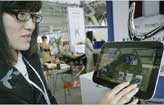Technology
Lenovo seeks to become the Apple of world's eye
Updated: 2011-06-20 09:20
By He Wei (China Daily)
Mediocre phones
Lenovo's latest effort to take on Apple was the launch of the PC tablet LePad in March in China.
"LePad, closer to the heart of Chinese consumers" was the advertising slogan. Yang Yuanqing, chief executive officer of Lenovo, said he was confident LePad would have grasped 20 percent of the domestic tablet market by 2012 because Lenovo knew the China market better.
Likewise, after years of producing various mediocre phones, Lenovo last year launched its first smartphone in China, LePhone with the aim of seizing back market share eroded by competitors, notably Apple's iPhone.
Running on the Android system, Lenovo adopted elements it considered would be popular in the Chinese market, such as a camera, a USB interface and applications that support multimedia.
According to Rory Read, chief operations officer with Lenovo, the company has designed a range of software for the LePad in cooperation with Chinese portals and social networking sites such as qq.com, sina.com and renren.com, to better cater to the needs of domestic users.
Wang made an upbeat assessment of LePad, given its proximity to the Chinese market.
"Based on our own internal survey, Apple's iPads only took up some 50 percent of tablet market share in the fourth quarter of 2010 in China, owing to its limited sales channels. This has left a vast space for other brands to grow in. Lenovo, as the biggest domestic vendor, has an edge straightaway."
|
||||
Just before LePad's entry into the tablet fray, its main rival Apple introduced iPad2. At 3,688 yuan ($570) in China, it was a price hard to match.
"Chinese PC makers are used to counting on a low-price strategy to compete with foreign brands, but Apple has turned the tables around this time, putting Lenovo in an awkward position," Huang said.
Apple has always been savvy in creating brand loyalty, targeting middle-class and fashion-minded consumers rather than the mass market, which gives the company the leeway to charge more.
The branding strategy of LePad, however, was flawed from the very beginning, said product positioning and marketing guru Al Ries, who is the co-founder of Ries & Ries consulting firm in the US.
In an interview with Economic Observer, Ries said by naming the products LePhone and LePad, Lenovo had locked them into well-known brand names, and that could create a wrong impression on consumers, who may regard them as bootleg and inferior versions of Apple's products.
While the global version of LePad was expected to hit the overseas market this month, Lenovo may find it hard to prove itself as desirable to Chinese consumers as their international peers, Jiang said, "because they have nothing unique to offer".
E-paper

Pret-a-design
China is taking bigger strides to become a force in fashion.
Lasting Spirit
Running with the Beijingers
A twist in the tale
Specials

Mom’s the word
Italian expat struggles with learning English and experiences the joys of motherhood again.

Lenovo's challenge
Computer maker takes on iconic brand apple with range of stylish, popular products

Big win
After winning her first major title, Chinese tennis star could be marketing ace for foreign brands




